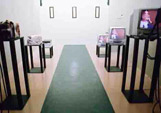
Practitioner Voices: Helena Walsh
Interviewed May 2004 by Becca Gill as part of the Total Theatre Explores research project.
Helena Walsh is an Irish artist based in London.
She attended Limerick School of Art and Design (1997-2001) and completed her Masters
in Fine Art at Chelsea College of Art and Design, London.
The core of her practice is live art, within which she also devises video and
installation works.
Her work has always formed an exploration into gendered experiences - more recently,
investigating the contemporary sexual politics of power in relation to the female body.
The work further examines the links and contradictions that exist between liveness and
mediatisation in relation to the body and live art practice.
Helena has exhibited both
in Ireland and the UK showing at The National Review of Live Art Glasgow 2002, The East
End Collaborations Platform, London 2002 and at Reception, London 2005.
Helena also devises street theatre works, is a facilitator of creative workshops and is
involved in artist-led and community initiatives.
How do you describe your artform practice?
My practice originates from a fine art background central to which is live art performance. My practice is open to collaborative ventures and often employs video and installation, both of which are strongly linked to and developed from my performance process.
How do you describe your work?
My work explores the socialised condition of the body and the regulation of individual identity. The materiality of the body is integral to my work and I see my body in the work as similar to a tool with which I positively violate preconceived systems, borders and rules.
My earlier completed works investigate the projection of ideological representations and assumptions of the specifically female body within contemporary visual culture. Within my current work, I am concerned to examine the effects of our intensely mediatised and technologised culture on both the body and real time experience.
Does gender matter in performance?
I feel the extent to which gender matters in performance wholly depends on the issues expressed within the work; for example in my work that questions the effects of gendered societal constructs on women, the use of my female body was highly relevant to these works.
However, I have seen many performance works within which gender is not an issue in relation to the topic depicted and so I feel that gender matters in performance to the degree that it is utilised by the performer as a means of expression.
Does your body determine the work you make or the way in which you make it?
As much of my earlier work is concerned to examine the experiences of the specifically female body I would say yes that my body has determined the work that I make. However, this is solely to do with my personal interests in this area and I do not feel that my body determines the work that I make to the extent that it limits my choice of subject matter by any means. I definitely think that my body does determine the way I make work as I am aware of my body's capabilities and the ways in which I am comfortable in using my body and this is something I utilise in a positive manner.
Would you consider your artistic priorities to be different to those of men?
No, I do not feel that my artistic priorities are different to those of men in the sense that I feel that the priority for any artist is to create a strong form of expression. My choice of subject matter may differ from that of men when I choose to reference my personal experience in relation to being female, but that is not something that I feel causes a distinction in artistic priorities but merely a difference in source material.
Would you consider that your aesthetic criteria are different to the aesthetic criteria of men?
I would consider my aesthetic criteria is different to that of men only through the use of my body in my work, whereby I use my specifically female characteristics.
How would you define feminism?
I would define feminism as a socially and politically conscious movement that works towards equality for each individual. For me, feminism is an open movement that takes a humanitarian viewpoint with the aim of liberating the individual and providing equal social, political and economic rights for everyone.
According to your own definition would you call yourself a feminist and what does that term mean in relation to yourself and your work?
Yes, I certainly call myself a feminist and in relation to myself it means that I am aware of the historical efforts of women, as well as the contemporary issues that place restraints on individual freedom. In relation to my practice it means that I strive to achieve a form of expression that is aimed towards transgressing the societal limitations that hinder equality.
Do you feel that the word feminism has shifted in meaning?
Yes, I think the word feminism has shifted in meaning as I feel the early feminist movement constructed a singular ideology of what it meant to be a feminist. Although I do not think that this was purposeful and to a certain extent had to do with the formation of a strong and defiant unified movement in the struggle to gain equal rights in the dominant patriarchal culture of the time, I feel that this enabled a categorisation or stereotypical viewpoint that resulted in a backlash against feminism and also closed down an open dialogue causing the exclusion of people whom although they were sympathetic to the aim of the movement did not feel that they fitted such criteria or did not feel comfortable in defining themselves in such a manner.
However, today I think feminism comes from a more open and all-encompassing viewpoint that avoids categorisation in the sense that it doesn't rigidly define a set of requirements necessary to support a feminist viewpoint and its aims have broadened as it is concerned with the liberation of each individual. So I think that the word feminism has shifted in meaning and this is largely to do with the progression feminism has achieved.
Do you think that theatre can effect social change?
Yes, I think theatre and indeed live art are integral in instigating social change, as these mediums promote a return to actual real time experience and the body as a physical and biological reality, which I think is extremely relevant in our intensely mediatised and technologised society. These mediums are also important in providing a means with which to explore social issues, opening up dialogue and a promoting a questioning of our contemporary culture.
What do you see as the biggest problem facing women in performance today?
I cannot define any one problem that I would describe as being the biggest problem facing women performers, but I feel certainly the abundance of idealised representations of women in contemporary visual culture has always and still does somewhat impinge negatively on the cultural view of women - but I feel the inherent liveness and the degree of personal control enabled through performance is effective in combating such imagery.
Also, I feel that particularly within more corporate live events, the extent to which media technologies dominate the performance is increasing, so that the event almost becomes completely mediatised, and that this is something that I think does impinge negatively on performance...but again this is something that can be dealt with through the medium of performance.
What from your perspective is the future for women within performance?
I think that the future for women in performance is extremely positive as there is a fantastic support structure available today, through a number of agencies that are extremely open and provide fantastic practical advice and opportunities.
Voices:




